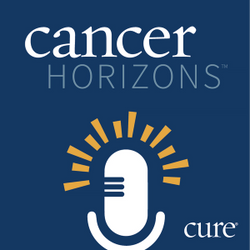- About Us
- Advertise / Support
- Editorial Board
- Contact Us
- CancerNetwork.com
- TargetedOnc.com
- OncLive.com
- OncNursingNews.com
- Terms & Conditions
- Privacy
- Do Not Sell My Information
- Washington My Health My Data
© 2025 MJH Life Sciences™ and CURE - Oncology & Cancer News for Patients & Caregivers. All rights reserved.
‘Stand Up For Yourself’: Facing Thyroid Cancer With Urgency, Positivity

A nationally-published, award-winning journalist, Alex Biese joined the CURE team as an assistant managing editor in April 2023. Prior to that, Alex's work was published in outlets including the Chicago Sun-Times, MTV.com, USA TODAY and the Press of Atlantic City. Alex is a member of NLGJA: The Association of LGBTQ+ Journalists, and also performs at the Jersey Shore with the acoustic jam band Somewhat Relative.
Award-winning journalist applied the same dedication that served her award-winning reporting in support of her own survival following a diagnosis of stage 4 anaplastic thyroid cancer.
Kate Rice is proof of the power of persistence and positivity while navigating a cancer journey.
Rice, an award-winning journalist, received a diagnosis of stage 4 anaplastic thyroid cancer in October 2021 — and quickly applied the same dogged dedication that had served her reporting in support of her own survival.
“When I was a reporter, none of my sources or desired sources could escape me. Sooner or later, they were going to have to talk to me, I just have that kind of determination,” Rice said. “And it wasn't so much that I wanted to find out about the cancer I got diagnosed with; I wanted to find out who could cure it.”
Years before receiving her thyroid cancer diagnosis, Rice had learned there were what doctors described as “indeterminant” nodules on her thyroid and was told to monitor them. She noticed small lumps on her neck in June 2021 and was told she would have to wait six months or so to be examined.
Rice, who had previously had a benign tumor removed from her neck and a case of melanoma, searched for doctors who could see her sooner — and, upon finally receiving her diagnosis, was told “I’ll pray for you” by a surgeon.
Anaplastic thyroid cancer, according to the American Thyroid Association, occurs in less than 2% of patients with thyroid cancers, but it is one of the fastest-growing and most aggressive of all cancers overall. The disease’s average survival rate is six months, and just approximately one-fifth of patients live longer than a year after receiving a diagnosis.
Immediately after receiving her diagnosis, Rice began sourcing for potential solutions, starting with a group text to her inner circle of loved ones.
“My cousin, who had been one of the first people I'd sent (a message to when I) cast that wide net out to try to get information, had promptly gone online and found that (The University of Texas) MD Anderson Cancer Center in Houston had a clinic that specialized in this very rare (cancer) … and actually cured people with it. So, I got my diagnosis, I think, at two o'clock Friday afternoon, I was walking home up Columbus Avenue, I guess, and on the phone with MD Anderson, to get in there because I can jump on the phone with both feet.”
Within days of receiving her diagnosis, Rice left New York City for Houston, Texas, seeking treatment from the Facilitating Anaplastic Thyroid Cancer Specialized Treatment Team at MD Anderson Cancer Center.
Such determined self-advocacy, Rice said, is “absolutely essential.”
“You have to stand up for yourself, you have to recognize that your doctors are specialists in whatever it is they're specialists in, but you're the specialist in your body,” she said. “And I knew something was going on. I mean, something was happening with my thyroid. Thyroid cancers, in general, are not the scariest cancers out there. They’re serious cancers, and the treatment for a whole bunch of different thyroid cancers is not fun. But I knew this was something that was potentially a very big deal.
“And so when the first doctors I saw in New York were very relaxed and I couldn't get in to see a doctor I've been seeing for years because I had what are called indeterminate nodules on my thyroid — (which are) not malignant, but (they’re) not benign, either — they were like, ‘Yeah, well, we can't get you in for six months, but that's OK,’ I'm like, ‘No, not OK.’ Even before I got the diagnosis, I was a pushy patient and we all have to do that. And the thing is, you're like, ‘Oh, I don't want to be much trouble. These guys are the pros, they know.’ But really, you've got to listen to your body and stand up for yourself.”
Following treatment at MD Anderson Cancer Center, Rice said she’s “fine.” Now a radio disc jockey and ski instructor in Park City, Utah, she returns to Houston every six weeks for immunotherapy treatments at MD Anderson. She also documented her cancer journey in the 2023 book “Cured: A Tale of Badassery.”
She has advice for fellow patients facing the long haul of a stage 4 cancer diagnosis.
“Stay positive. Realize we all have to fight this cancer trauma that understandably, many people in this country, in this in the world, carry because we've seen terrible things happen to people we love, when my dad died of prostate cancer,” Rice said. “But, the thing to remember is so many cancers now are either curable or treatable and manageable. The whole thing is getting to the right place in time, which is a challenge with our healthcare system. But you really have to remember there is no such thing as false hope there is only hope.”
For more news on cancer updates, research and education, don’t forget to subscribe to CURE®’s newsletters here.
Related Content:

